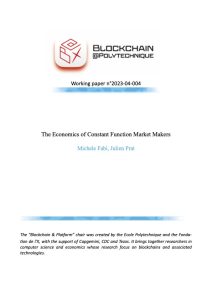Contagion in Decentralized Lending Protocols: A Case Study of Compound
We study financial contagion in Compound V2, a decentralized lending protocol deployed on the Ethereum blockchain. We explain how to construct the balance sheets of Compound’s liquidity pools and use our methodology to characterize the financial network. Our analysis reveals that most users either borrow stablecoins or engage in liquidity mining. We then study the robustness of Compound through a series of stress tests, identifying the pools that are most likely to set off a cascade of defaults.

